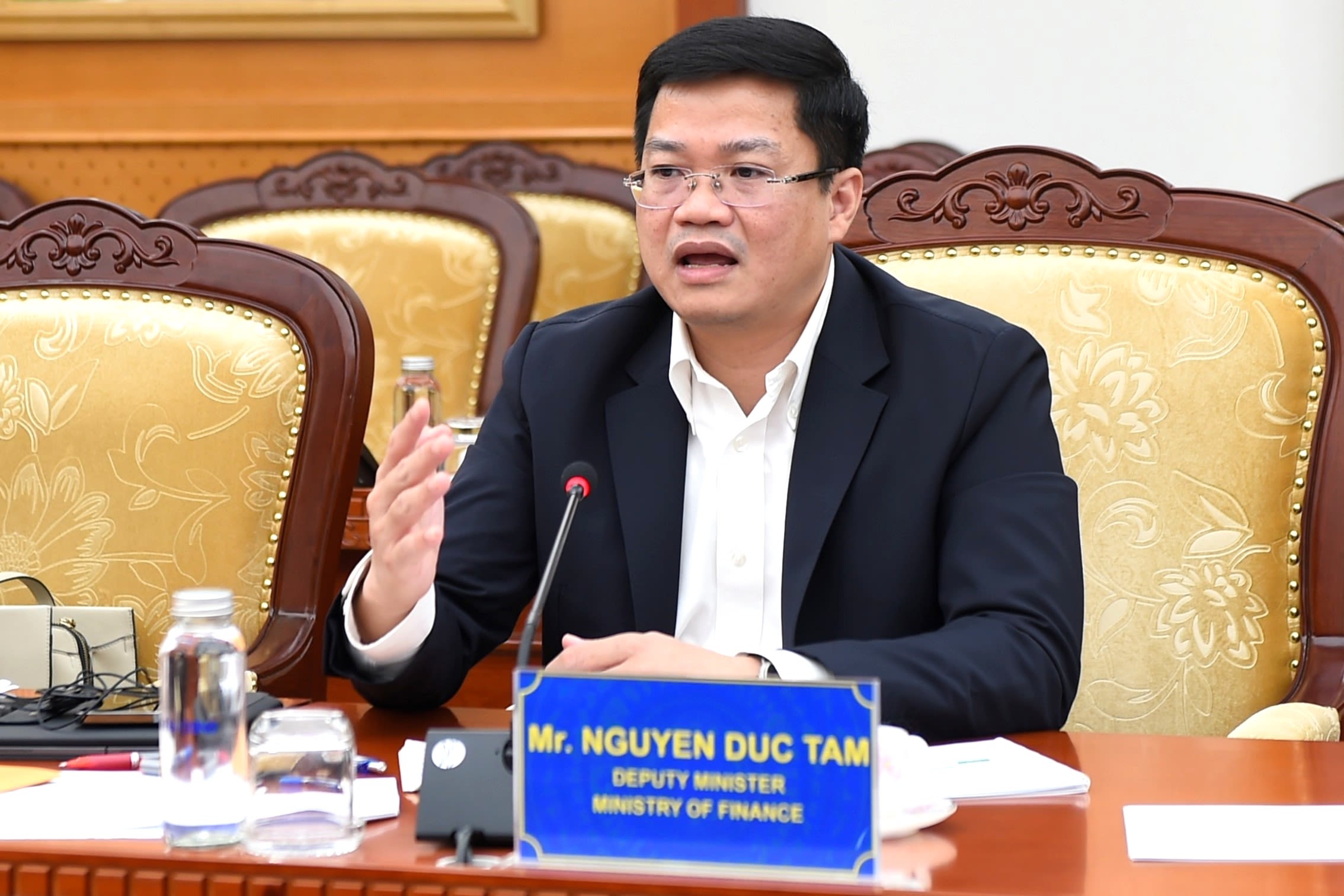Creating momentum for strong development of private economy

Resolution No.68-NQ/TW of the Politburo on private economic development is being brought to life through key policies and strategic priorities to promote the private economic sector to become the most important driving force of the national economy. Deputy Minister of Finance Nguyen Duc Tam had an interview with the press on this issue.
AROUSING BUSINESS CONFIDENCE
Q: Deputy Minister, the positive signals regarding the situation of business development are one of the bright spots in the economic picture in the first 10 months of 2025, especially after the issuance of Resolution No.68-NQ/TW of the Politburo on private economic development (Resolution No.68). Could you please share more about this content?
A: It can be affirmed that the issuance of Resolution No.68 has created a new vitality, arousing the spirit of entrepreneurship and strengthening business confidence. Since May 2025, when the Politburo issued Resolution No.68, on average, more than 18,500 new enterprises were established each month, an increase of 43% compared to the average of the first 4 months of 2025.
In the first 10 months of 2025, the whole country saw 255,800 enterprises either newly registered or returning to operation, an increase of 26.5% compared to the same period in 2024 and 34% higher than the number of enterprises withdrawing from the market; the total capital of enterprises in the private economic sector added to the economy was estimated at nearly 5.2 million billion VND, an increase of 98.2% over the same period in 2024.
Accumulated to the end of October 31, 2025, the whole country had more than 1 million enterprises operating in the economy.
Accumulated to the end of October 31, 2025, the whole country had more than 1 million enterprises operating in the economy. In addition, the number of enterprises returning to operation from May 2025 to September 2025 reached an average of more than 12,000 enterprises/month, with a cumulative total of nearly 93,000 enterprises returning to operation in the first 10 months of 2025, an increase of more than 40% over the same period in 2024.
Thus, the average number of enterprises entering and re-entering the market grew strongly after Resolution No.68 was issued, reaching nearly 32,000 enterprises/month, marking an increase of more than 28.4% compared to the average of the first 4 months of 2025 (24,900 enterprises/month).
The average number of enterprises entering and re-entering the market grew strongly after Resolution No.68 was issued, reaching nearly 32,000 enterprises/month, marking an increase of more than 28.4% compared to the average of the first 4 months of 2025 (24,900 enterprises/month).

The business environment has improved significantly. This is clearly shown through the positive assessment of the business community. A survey by the Private Economic Development Research Board (Board IV) shows that more than 46% of businesses “expected/very expected” the effectiveness of Resolution No.68, achieving the highest average score among business confidence indicators.
In particular, to achieve the goal of having two million enterprises by 2030, the Ministry of Finance is proactively coordinating with relevant agencies to improve institutional frameworks and foster a favourable, transparent, and equitable business environment. Market entry barriers and compliance costs will be removed through the substantial reduction of administrative procedures and the reform of business conditions.
To achieve the goal of two million enterprises by 2030, the Ministry of Finance continues to actively coordinate with relevant agencies to complete the institutional framework and create a favourable, transparent, and equitable business environment.
According to the plan for streamlining and simplifying administrative procedures approved by the competent authorities, the total number of administrative procedures related to production and business activities to be reduced or simplified is 2,941 procedures, accounting for 60.2%, along with 2,263 business conditions in conditional business sectors, representing 31%. At the same time, the total time for resolving administrative procedures is expected to be cut by 13,182 days, while compliance cost savings are estimated at over 34.2 trillion VND per year (approximately 29%).
Q: To realise the goal of having two million business households by 2030, Resolution No. 68 requires substantial and effective support for small, micro, and household businesses. In your opinion, what are the key factors to encourage household businesses to transform into enterprises?
A: Currently, there are around 5.2 million household businesses nationwide. This is a tremendous potential sector for achieving the enterprise development goal. If only a small portion of them boldly transform into enterprises, the target of two million enterprises is entirely attainable.
However, in practice, many household businesses remain hesitant to make the transition for three main reasons: The compliance cost gap between household businesses and enterprises remains significant; household businesses lack understanding of enterprise-related legal regulations and are unfamiliar with accounting record management, leading to psychological reluctance; household businesses previously enjoyed simpler tax, bookkeeping, invoicing, and accounting regimes than enterprises.
Currently, there are around 5.2 million household businesses nationwide, which represents a vast potential for enterprise development.
Currently, there are around 5.2 million household businesses nationwide, which represents a vast potential for enterprise development.
To address these barriers, Resolution No. 68 introduces a policy to abolish the lump-sum tax regime starting from 2026, aiming to enhance transparency in household business operations while encouraging them to convert into enterprises.
When they become enterprises, they will be entitled to a wide range of incentives and support measures, including preferential access to credit, land, training,technology and tax incentives, in line with Resolution No. 198/2025/QH15 of the National Assembly on special mechanisms and policies to promote the development of the private sector.
At present, the Ministry of Finance has completed a draft decree guiding the implementation of Resolution No. 198 and submitted it to the government for consideration and approval. The draft introduces practical forms of support such as free accounting software, short-term training courses, assistance with online business registration, and reduced conversion time.
It is expected that once the decree is promulgated, the policies supporting newly established enterprises and assisting household businesses in converting into enterprises will create positive momentum for the transformation process.
To support household businesses in converting into enterprises, the Ministry of Finance is focusing on two main groups of solutions: improving the legal and policy framework; and implementing practical support measures.
To support household businesses in their transition to enterprise status, the Ministry of Finance is concentrating on two main groups of measures: improving the legal and policy framework, and implementing practical support initiatives.
Accordingly, the ministry is urgently studying amendments to the Law on Tax Administration and the Law on Personal Income Tax, with a view to establishing a new management model featuring simplified, transparent, and easy-to-implement declarations. It is working to simplify administrative paperwork to ensure that household businesses are not placed under excessive pressure during the transition,and is also researching the development of a Law on Individual Business to narrow the gap in governance structures and financial–accounting regimes between household businesses and enterprises.
Tax authorities at all levels are deploying officers to grassroots areas to support local household businesses. (Photo: Tax Department)
Tax authorities at all levels are deploying officers to grassroots areas to support local household businesses. (Photo: Tax Department)
To ensure synchronised implementation, the Ministry of Finance is accelerating the upgrade of technical infrastructure for the abolition of presumptive taxation on household businesses from 1 January 2026; strengthening digital transformation in tax administration by applying e-invoices generated from cash registers to ensure accurate and sufficient tax collection while reducing time and costs for household businesses; and providing free electronic tax filing and payment systems, e-invoice software, and accounting software, with priority support for disadvantaged household businesses in the initial phase.
Communication efforts to raise awareness and improve management capacity among household businesses have also been strongly promoted by the Ministry of Finance, especially the tax sector, in recent times. In addition, the tax sector has provided hands-on guidance to household businesses in issuing e-invoices, filing tax returns, and using accounting software.
"The Ministry of Finance is urgently reviewing amendments to the Law on Tax Management and the Law on Personal Income Tax, aiming to develop a new management model with simpler, more transparent, and easier-to-apply filing procedures."
Deputy Minister of Finance Nguyen Duc Tam
Enhancing private enterprises’ access to resources
Q: The biggest obstacle currently facing the private sector is access to resources, particularly capital, land, technology, and high-quality human resources. What measures will the Ministry of Finance adopt to address this issue, Deputy Minister?
A: As the Government’s advisory body on finance and the State budget, and in supporting enterprises and household businesses, the Ministry of Finance plans to implement several key measures to help small and medium-sized enterprises (SMEs) and innovative start-ups in improving access to resources. Specifically:
First, the ministry will focus on reforming tax and fiscal policies to create stronger incentives for SMEs and innovative start-ups; proposing appropriate corporate income tax incentives for income reinvested in research, development, and innovation; exempting or reducing certain fees and charges during the initial stage for technology start-ups; and applying faster deduction and refund mechanisms for enterprises investing in innovation projects.
Second, the ministry will ensure the effective operation of the Small and Medium Enterprise Development Fund by reviewing and improving the model of off-budget State financial funds (such as credit guarantee funds, SME development funds, and local development investment funds) to establish the most suitable framework for State management needs and for supporting private enterprises — particularly SMEs and innovative firms.
Third, the ministry will actively coordinate with ministries, sectors, and localities to review and create conditions for enterprises to lease redundant public assets such as land, factories, and infrastructure on a public and transparent basis; and accelerate the implementation of Resolution No. 198 to enable SMEs, innovative enterprises, and supporting-industry businesses to access land in industrial parks and clusters.
In addition, the Ministry of Finance will step up support for digital transformation, management, and financial-tax training, as well as strengthen coordination with business associations so that enterprises can better understand and promptly benefit from support policies.
Q: In your opinion, what are the key priorities in the next phase to realise the enterprise development goals set out in Resolution No. 68?
A: “I believe there are three groups of tasks that require focused efforts in the coming period. The first is to continue improving institutions and policies supporting enterprises in line with the orientations set by the Politburo in Resolution No. 68 and by the National Assembly in Resolution No. 198. This aims to swiftly bring new policies into practice to improve the investment and business environment; support access to land and production premises; enhance access to financial resources, credit, and public procurement; and promote science, technology, innovation, digital transformation, human resource development, and the formation of medium- and large-scale enterprises and pioneering firms capable of boosting competitiveness.
It is crucial to continue reducing costs and simplifying administrative procedures to create a transparent, efficient, and business-friendly investment environment. Accordingly, the Ministry of Finance is accelerating digital transformation across taxation, customs, and treasury operations, aiming for 100% of public services to reach online level 4. This will help enterprises save time and reduce costs while enhancing transparency in state management activities.
In addition, the ministry is focusing on removing barriers to market entry and operations, substantially cutting administrative procedures, reducing compliance costs, and reforming business conditions. It is also reviewing and resolving obstacles in investment, land, construction, and planning to create a clear, stable, and predictable legal framework for enterprises.
The Ministry of Finance always regards enterprise support not only as the issuance of policies but also as a process of accompanying, listening, sharing, and promptly addressing difficulties — developing policies that foster growth.
The next priority is to build and foster confidence and an entrepreneurial spirit across society. The Ministry of Finance affirms that supporting businesses requires constant engagement and timely assistance, ensuring that policy development truly enables enterprise growth.
Through a comprehensive set of solutions, from institutional and policy reforms to practical implementation, the Ministry of Finance is gradually removing bottlenecks and generating new momentum for the business community. These efforts contribute to making the private sector the most important driving force of the national economy, a pioneering force in science and technology development, innovation, and digital transformation — propelling growth, creating jobs, raising labour productivity, and enhancing national competitiveness in the new era: an era of strength, prosperity, civilisation, and happiness for the nation.









